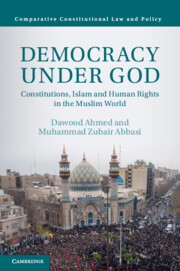Book contents
- Democracy Under God
- Comparative Constitutional Law and Policy
- Democracy Under God
- Copyright page
- Brief Contents
- Detailed Contents
- Figures
- Tables
- Preface
- Acknowledgments
- Note on Translation, Transliteration, and Citations
- Introduction
- Part I
- Part II
- Part III
- 5 Islamic Supremacy Clauses and Rights
- Conclusion
- Bibliography
- Index
5 - Islamic Supremacy Clauses and Rights
Islamic Review in Practice
from Part III
Published online by Cambridge University Press: 23 February 2023
- Democracy Under God
- Comparative Constitutional Law and Policy
- Democracy Under God
- Copyright page
- Brief Contents
- Detailed Contents
- Figures
- Tables
- Preface
- Acknowledgments
- Note on Translation, Transliteration, and Citations
- Introduction
- Part I
- Part II
- Part III
- 5 Islamic Supremacy Clauses and Rights
- Conclusion
- Bibliography
- Index
Summary
Having identified that “Islamic” constitutions also often, counterintuitively, contain many democratic features and rights, Chapter 5 moves from the analysis of Islam and rights in a constitutional “textual” setting to the question of how the interaction between the two plays out in practice when litigating. It does so by using examples of court cases (for example, of women’s rights, access to justice, etc.) in Egypt and Pakistan, where the two different strands of the constitution – rights and Islam – could potentially have conflicted but did not. It shows how “modernist” judges interpreted the Islamic supremacy clauses to not only protect the rights of citizens but in some cases, for example, in cases where the right to “access to justice” was at stake, also used such clauses to develop new rights. However, it also illustrates that in other cases – such as to do with blasphemy – the Islamic content of the constitution can and has been used to erode rights to freedom of expression and even to freedom of religion. Nevertheless, the chapter’s contribution is to draw on comparative scholarship to argue that a political pursuit of Islam does not necessarily need to impede rights provided various institutional measures are in place – including independent courts with the power to engage in judicial review, competing and intellectually robust religious authorities and legislatures that can actively construct and critique religious narratives of law, and, above all, a state that can bring those with “extreme” interpretations (e.g. Salafi parties) into the nonviolent political arena and challenge them politically.
- Type
- Chapter
- Information
- Democracy under GodConstitutions, Islam and Human Rights in the Muslim World, pp. 153 - 184Publisher: Cambridge University PressPrint publication year: 2023

